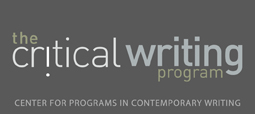Penn Professors on Writing in Anthropology
Dr. Philippe Bourgois

About the Professor
As a Penn Integrates Knowledge professor, Dr. Philippe Bourgois holds faculty appointments both in the Department of Anthropology and at the Perelman School of Medicine. Now a cultural and medical anthropologist, he grew up wanting to be a famous novelist and is living out the dream by writing ethnographies on homeless heroin injectors instead. He considers anthropology and its writing as much art as it is science.
Personal Writing Tips
For students who may require additional assistance with the mechanics of writing, Dr. Bourgois refers students to the Writing Center or other various tutorial writing programs. In general, he says, "To improve one's writing, there's no shortcut—you just have to write. And it works like magic!"
Important Criteria for Student Writing
Dr. Bourgos's criteria for good writing is a bipartite list. He considers the first set far more important than the second. He emphasizes original ideas and reasoning and evidence ahead of grammar and mechanics, proper formatting and other such technical criteria.
- Having original ideas
- Reasoning and evidence
- Demonstrating mastery of others' ideas
- Organization
- Style
- Grammar and mechanics
- Following the assignments instructions
- Proper formatting (font, margins, etc.)
- Following the discipline's citation practices
Personal Writing Process
Dr. Bourgois calls his writing process an "obsessive process of editing," describing it as writing very quickly and then re-writing twenty times. His first drafts are almost like detailed outlines; subsequent revisions involve large reworkings, reorganizations and restructurings (e.g., throwing out large sections, copy editing, etc.). He usually tries to force himself to start writing before he finishes completing all the participant-observation research, usually by writing the "easy" parts first that he knows must be included no matter what. "I find that the more times I rewrite something, it gets much better," he shares. "There’s no way around it; it just takes tremendous discipline."
Additional Comments
Dr. Bourgois shares some of his thoughts on the dichotomy in anthropological writing between art and science:
"In any part of anthropology that uses ethnography or participant observation as its primary method, writing is extraordinarily important. On the one hand, we want to be writing about reality; we want to be writing science. On the other hand, we recognize that we are actually artists in the way we produce our data. The way one produces knowledge and communicates to a wider public in anthropology is less through articles and more through books called ethnographies, which tell stories of our fieldwork.
"In the 1980s there was a sudden realization in anthropology that we are as much artists as we are scientists. We have to be more upfront, self-conscious, self-critical, self-reflexive about the craft of our writing. Writing Culture: The Poetics and Politics of Ethnography is a volume by several leading anthropologists that put this in center stage; any student interested in anthropological writing should read an article from this book. We all of a sudden had to start doubting ourselves in terms of our old-fashioned positivist sense of science and critiquing ourselves into realizing that we produce reality as much as we represent it in our books, this self-recognition of the meaning-making quality of our writing."
"There is a division between anthropologists who say they write science and reality and other folks who say that anthropology is a totalizing trope. Ethnography is usually written in the first person. We had to learn to beware of that hubristic, colonial sense of omniscient knowledge on the part of the elite anthropologist who comes in to study a culture and says, in the third person omniscient voice: 'This is who the 'x' people are; this is what their reality is.'
"Reading Writing Culture changed the way I did fieldwork and the way I took fieldwork notes. I started to put myself into my notes as a character so I would understand what effect I was having on the construction of knowledge. I started to pay a lot of attention to not cutting myself out, but rather showing my subjectivity. I wanted to show when I got angry, when I got upset and how it might have changed what I was able to see and what they were able to say. I gained a self-awareness of the fact that the reality an ethnographer writes up is affected by the presence of the ethnographer, and the way an ethnographer frames information affects how it gets digested by the reader. The way I resolved it was that I never trust my sense of reality. I’m always thinking, ‘How am I distorting reality? How am I being biased? How is my presence transforming things?’ When you write out a tape recording of someone talking, you can’t capture the body language, the tone of voice… all that stuff gets lost."
Links
Back to Writing in the DisciplineOther professors in anthropology: Dr. Deborah Olszewski, Dr. Theodore Schurr, Dr. Deborah Thomas
© 2013-2014 The University of Pennsylvania
